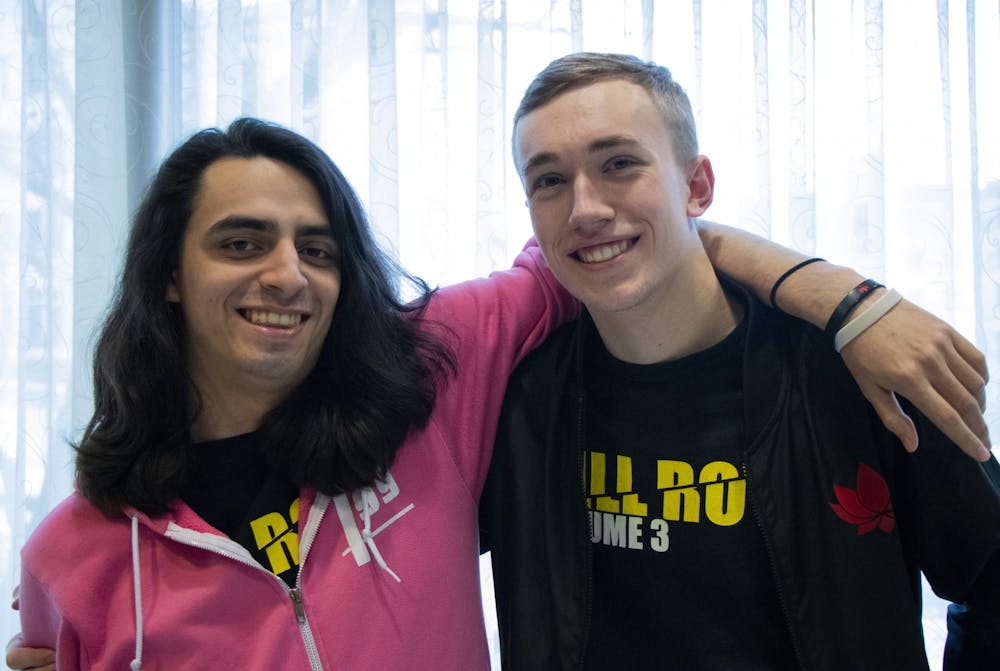The fifth volume of the Kill Roy tournament series was especially hectic for the IU tournament organizers. They dealt with pushing back the tournament date from late fall and losing their stream coordinator to a bigger tournament happening the same weekend.
Kill Roy 5 didn’t start until 10 a.m. Saturday at the Wilkie Auditorium, but the organizers of the Super Smash Bros. tournament started setting up before the sun rose.
“I slept through my 5:30 alarm and woke up at 6:22,” Austin Fletcher, IU senior and president of the Smash Club, said.
The day started just as every big IU smash tournament does, with an early morning breakfast at Denny’s before setting up the venue.
“It’s an old Smash at IUB tradition,” Fletcher said.
The tournament, with more than 100 entries, boasted three smash games available for participants to compete in: Super Smash Bros. Ultimate, Super Smash Bros. Melee and Super Smash Bros. 64. All three are played on different generations of consoles and had their own section in the Wilkie Auditorium.
Kill Roy 3 had around 200 attendees, the largest of the series.
“It’s a smaller tournament this year, but it’s still a lot of work for us,” Leonardo said.
Each game had its own stream on Twitch.tv and a head organizer making sure the events went smoothly. Sullivan captained Ultimate, and Fletcher looked after Melee with Patrick Donaldson, a former top-50 Smash 64 player, overseeing the Smash 64 side event.
The space was crawling with wires connecting consoles to screens and computers to outlets. Melee and Smash 64 can only be played on CRT TV monitors, so different varieties of the television were scattered around the venue. Some were as small as laptop screens and others as big as minifridges.
Ultimate, the newest of the games offered at the tournament, was played on HD screens set up in the middle of the room with a projector in the front for matches played on stream.
The Kill Roy series has always been seen as a lead in to IU’s Full Bloom tournament, which is played in April. The newer members of the smash club cut their teeth at this relatively small tournament before trying their hand at organizing one of the bigger Super Smash Bros. events in the Midwest.
“This is their first taste of a big event,” Fletcher said. “Our big locals get 70 to 80 people. Now we have a 150-person event and then in March, we get 700.”
IU sophomore Joma Leonardo is a pool leader and tournament organizer at Kill Roy 5. Leonardo, who started volunteering last semester, said his skills as an organizer have improved since his first year, especially since his time helping with last year’s Full Bloom. Even though this year’s installment is smaller than previous years, that doesn’t mean he can slack off.
One of Leonardo’s jobs was managing pool play for Melee, the stage of the tournament before players get seeded into the larger bracket.
He walked around with a clipboard and pencil, recording every match in his pool and deciding which matches should be put on the Melee stream. He yelled out player names and made sure everyone either played their game or was disqualified for not showing up on time.
Leonardo also joined the Ultimate stream for bracket play, commentating matches from the winners' side of the tournament.
The eventual winners of the tournament were top-100 player Anees “Free Palestine” Assaf for Melee, Johannes “Johann” Schadow, a local Indiana player, for Ultimate and a player called “SKG” for Smash 64.
For Fletcher and Sullivan, this is one of their last IU Smash events.The two heads of the Smash Club are also roommates and have worked this tournament series since its inception. Sullivan’s first smash event was Kill Roy 1 and Fletcher’s was Kill Roy 2.
“We got one more go at this in two months with Full Bloom, then we’re gone,” Fletcher said.
While Fletcher said it pains him to think about the end of his time with the club, he and Sullivan are confident in the club going forward.
“Just to see the turnover with the staff is a refreshing experience because normally you see someone who has been in the business for five years, but as students you are constantly rotating,” Sullivan said. “We get to hand it off to whoever gets it next, and hopefully they’ll do the same, if not better.”






